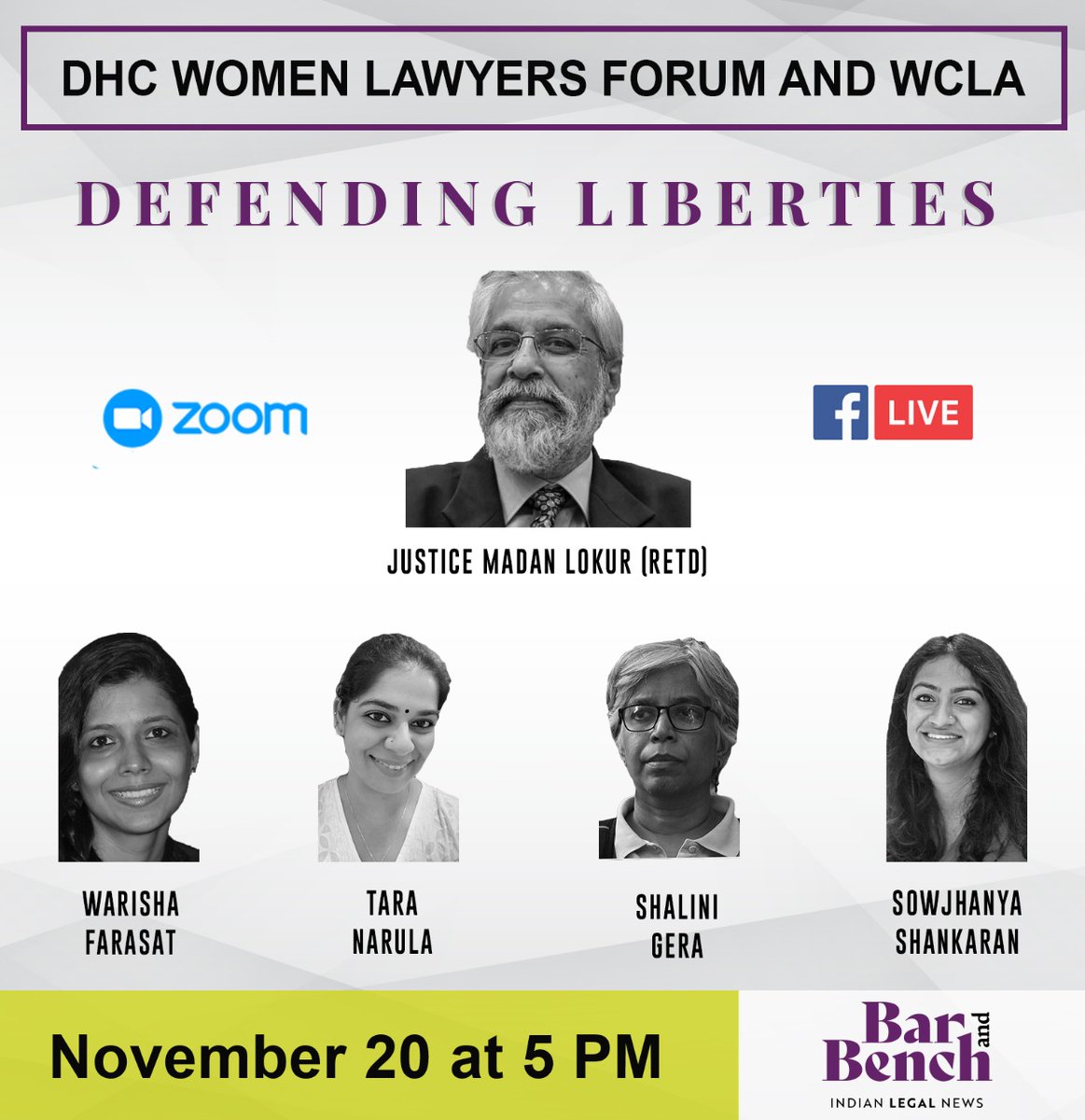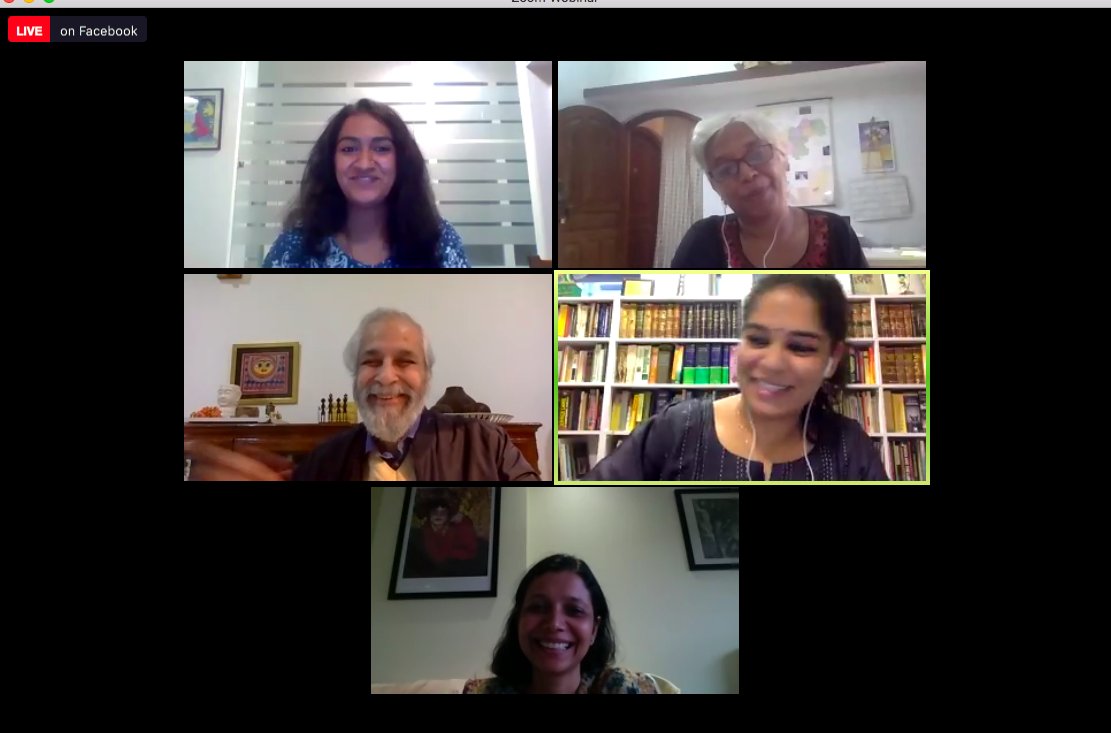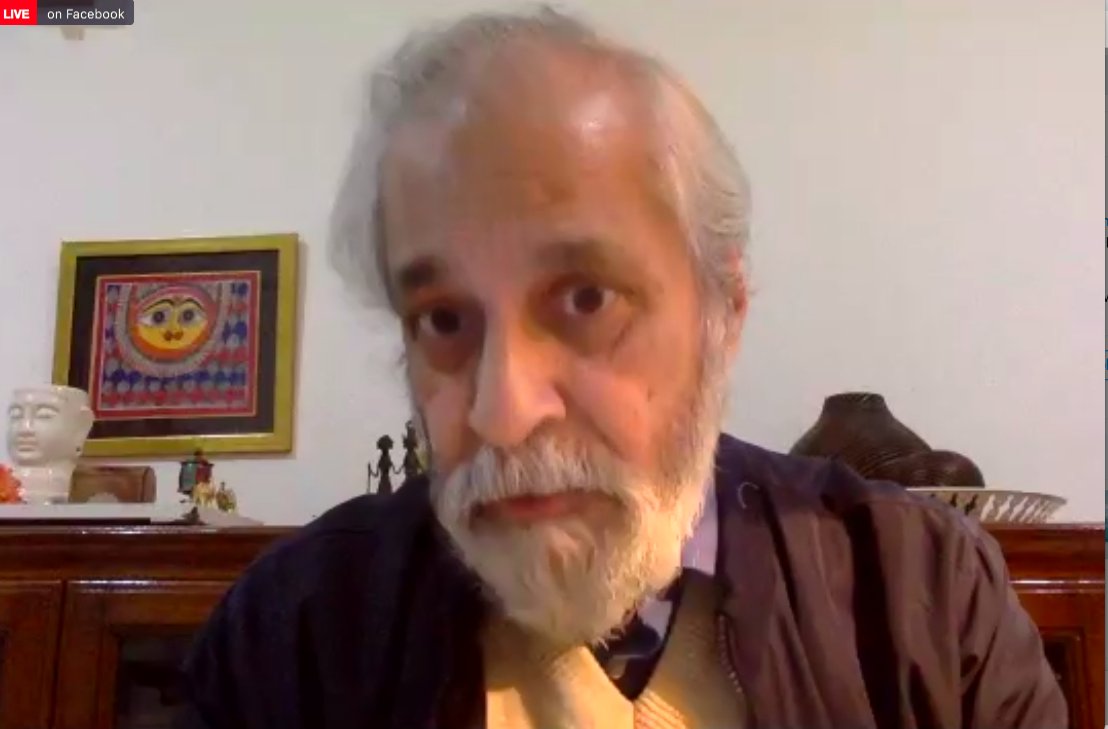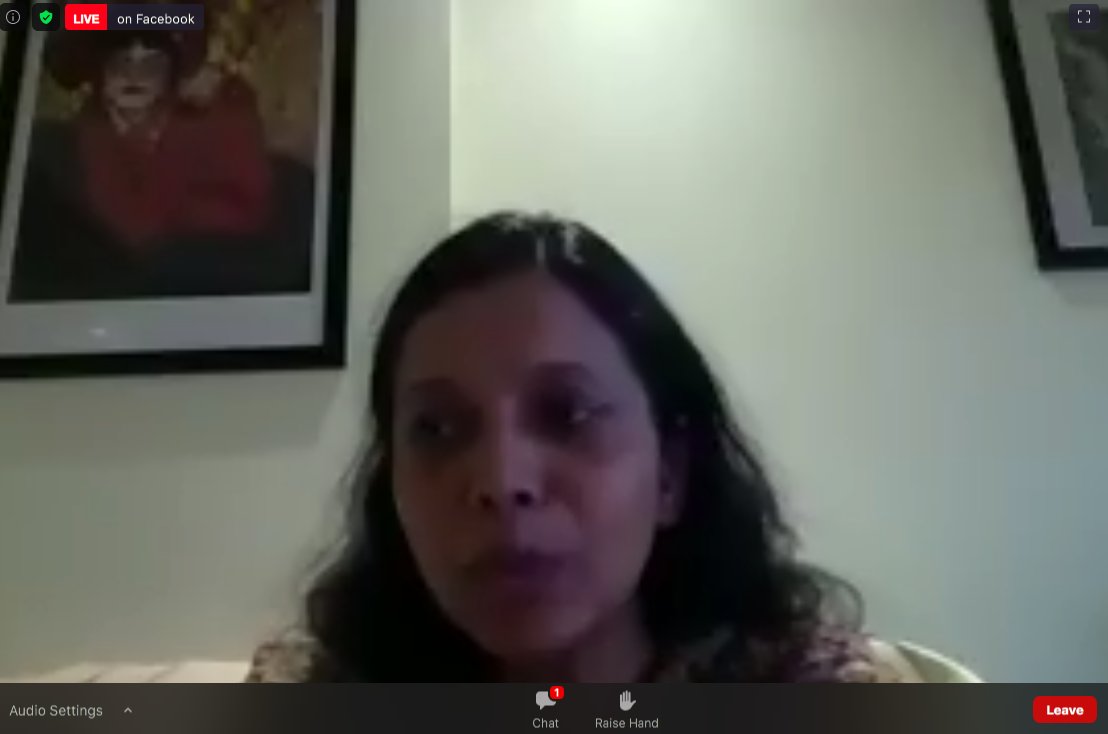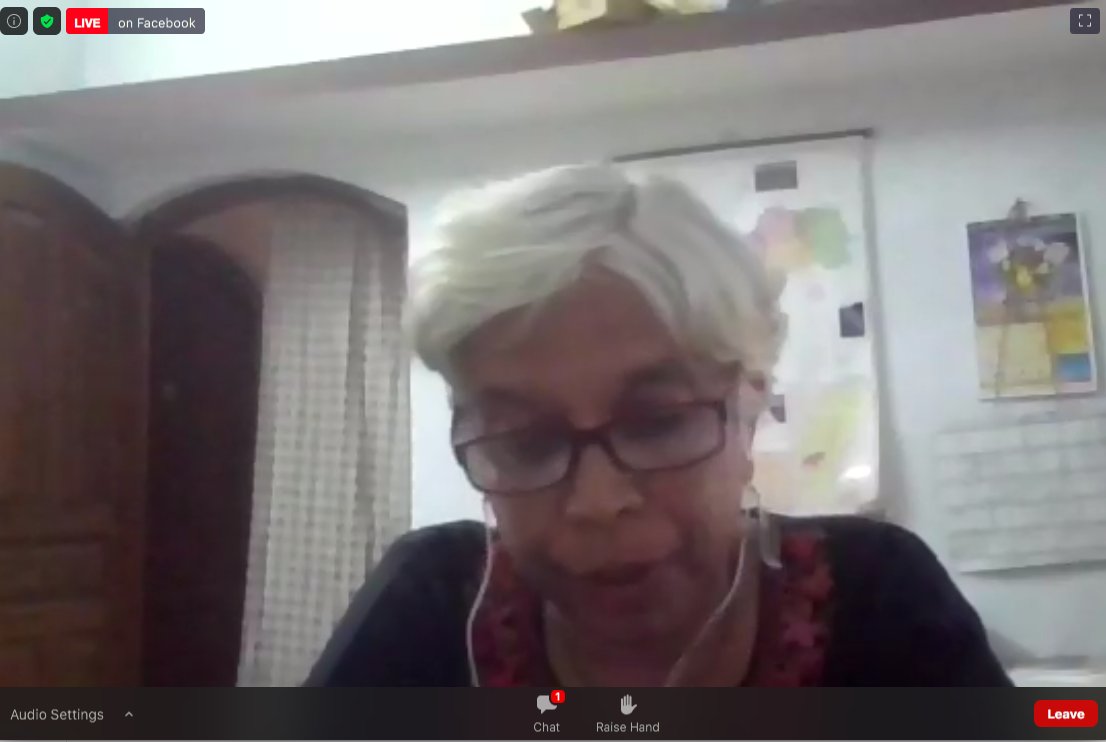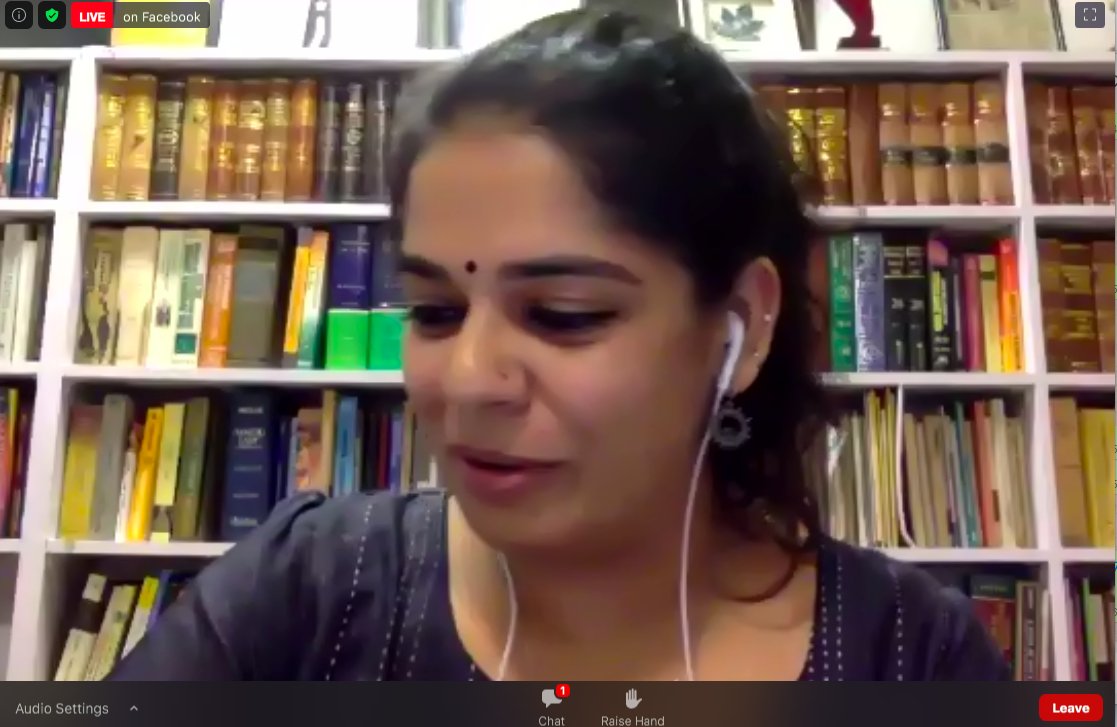Justice (retd.) Madan Lokur to shortly speak on the theme "Defending Liberties" in a virtual discussion hosted by the Delhi High Court Women Lawyers Forum and WCLA.
Justice (retd.) Lokur will also interact with Warisha Farasat, Tara Narula, Shalini Gera and Sowjhanya Sukumaran.
Justice (retd.) Lokur will also interact with Warisha Farasat, Tara Narula, Shalini Gera and Sowjhanya Sukumaran.
Adv Tara Narula starts off the discussion with a query to Justice (retd.) Lokur on the writ of habeas corpus.
@taranarula1
@taranarula1
Lokur: The topic you have selected, "defending liberties", is a very important topic and I'm glad you have done that.
Justice (retd.) Lokur observes that the writ of habeas corpus is important and should be issued liberally.
Because when you are talking about preventive detention, you’re talking about putting person without a trial: Lokur
Lokur says that in the past, you would find very few cases where a person has not been given relief under a writ of habeas corpus.
Lokur: Courts have even said that even when a petiton for habeas corpus has been dismissed, another can be filed. So, it is not as if that once the writ petition is dismissed, that is the end of the road.
Lokur: So the Supreme Court has been liberal (on habeas corpus petitions), and that's the way it should be.
Supreme Court has even said you don't have to file a petition if can even be a post card.
Supreme Court has even said you don't have to file a petition if can even be a post card.
Justice (retd.) Lokur recalls that when he was serving at Gauhati, he even entertained an SMS alleging illegal detention in jail as a habeas corpus.
Lokur: I would certainly give it (habeas corpus) the broadest and widest of interpretations
Warisha Farasat: Habeas Corpus is a very time-sensitive writ.
She adds that, therefore, it should be entertained by courts swiftly
She adds that, therefore, it should be entertained by courts swiftly
Shalini Gera: Habeas Corpus is a very important writ... It needs a functional judicial system where everyone has faith in its efficacy, and sometimes it is very difficult to have that faith.
Sowjhanya Sukumaran: In some of the cases in Delhi Riots.. with legislation like UAPA - the difficulty is that a longer period of detention is permitted under the statute. The difficulty is, as lawyers, what is important for your client...
Sukumaran asks Gera: Strategically, as a lawyer, what would you prioritise?
Gera observes that it can be difficult.
Gera: It's the process that kills you. Even with acquittals, it is not that you have been able to get people out in a short amount of time... every case has to be dealt with what is the pressing need at the time.
#UAPA
Gera: It's the process that kills you. Even with acquittals, it is not that you have been able to get people out in a short amount of time... every case has to be dealt with what is the pressing need at the time.
#UAPA
Gera adds that in some of the cases, the implication of the accused is ridiculous.
Gera: Their name won't be there In any of the Section 161s, but only in the final report.
Gera: Their name won't be there In any of the Section 161s, but only in the final report.
Gera: Judges have said that don't waste your time with bail and discharge applications...
Gera: #UAPA is a very political case, always. A lot happens on what's outside the courtroom, as well as inside the courtroom.
Gera: #UAPA is a very political case, always. A lot happens on what's outside the courtroom, as well as inside the courtroom.
Warisha Farasat adds that the charge sheets in such cases are often voluminous, but without a lot of substance.
#UAPA
#UAPA
Warisha Farasat: Chargesheets are 10,000, 30,000 pages. Many a time these lengthy charge sheets contain nothing, in terms of actual prosecutable evidence.
First thing, as lawyers, we should not be intimidated by lengthy charge sheets.
#UAPA
First thing, as lawyers, we should not be intimidated by lengthy charge sheets.
#UAPA
There is no doubt that training has to be given to Judges: Lokur says, in response to a query.
Lokur: Problem is in many of the cases, the judges get transferred... It is also possible that the moment training is over, you go to some other place. So entire training gets wasted.
Lokur: Problem is in many of the cases, the judges get transferred... It is also possible that the moment training is over, you go to some other place. So entire training gets wasted.
Qn: Is it possible to incorporate the need for day-to-day trials in cases under special acts (PC Act, PMLA) where the detention period is longer?
Lokur: Yeah, it must be done.
He adds, however, there may be practical difficulties.
Lokur: Yeah, it must be done.
He adds, however, there may be practical difficulties.
Tara Narula poses question on #MediaTrial, also referring to how #SushantSinghRajput case was reported and how WhatsApp chats etc were put on the public domain.
Today, as reportedly by Bar and Bench, that Kappan case was adjourned and the Bench expressed reservations on the manner of reporting, apparently not attributed to the petitioner, she adds.
Narula: How do we tread the line? Do we fight fire with fire?
#MediaTrial
Narula: How do we tread the line? Do we fight fire with fire?
#MediaTrial
Lokur: Two answers. First, is to fight fire with water. Ask the court why is this happening? Why are WhatsApp messages etc. coming to the public domain?
If the court does nothing, then maybe fight fire with fire. But first, go to the court, he adds.
If the court does nothing, then maybe fight fire with fire. But first, go to the court, he adds.
Even in the #SushantSinghRajput case, where did the WhatsApp messages come from? Must be from prosecuting agencies or someone else, Lokur observes.
The court is bound to ensure a fair trial. If not, maybe fight fire with fire, he adds.
#MediaTrial
The court is bound to ensure a fair trial. If not, maybe fight fire with fire, he adds.
#MediaTrial
Sowjhanya Sukumaran: "Activist Lawyers" often used as an insult. Scathing remarks are made by judges in court, orders are written trying to cast aspersion on why a particular lawyer would take a particular case. This becomes particularly difficult for women lawyers.
Sukumaran adds that it is some opine that you can either be a "lawyer" or and an "activist" and not both.
What can be done to overcome this problem, she asks.
What can be done to overcome this problem, she asks.
Farasat observes that this is a worrying trend in the last two or so years.
She adds: Ideology must be put aside and the Bar must come to support. There is some responsibility on the senior members of the bar and the Bar President to assure the lawyers that we are with you.
She adds: Ideology must be put aside and the Bar must come to support. There is some responsibility on the senior members of the bar and the Bar President to assure the lawyers that we are with you.
Responding to another Qn, Lokur: By and large, ideology should not come in the way of your professional assignment.
If it does, it means you're not going to defend someone who does not share your ideology.
Ideology and the profession should be kept apart.
If it does, it means you're not going to defend someone who does not share your ideology.
Ideology and the profession should be kept apart.
Lokur: There may be instances where you might find where it is better to sacrifice... for the sake of maintaining ideology, - that should happen on very, very rare occasions.
Referring to remark re Judges criticising lawyers
Lokur: I think that is very unfair to target a lawyer on the ground of ideology or because the lawyer is appearing for a particular kind of client. That is very very unfair.
Lokur: I think that is very unfair to target a lawyer on the ground of ideology or because the lawyer is appearing for a particular kind of client. That is very very unfair.
Lokur: We have had lawyers who have appeared nothing but preventive detention matters... the lawyers were good! You cant say because a lawyer is doing a COFEPOSA matter, he is also a smuggler.
Lokur: I don't think the judge should ever get involved in the relationship between a lawyer and a client.
Gera: I think there has been a quantum shift in the way the State is treating lawyers who are defending dissidents. People are getting targetted as "Jihadi lawyers" and "Naxalite lawyers"
Gera refers to a webinar she says was hosted recently by a "right-wing think tank" where "Urban Naxals" was discussed, and where "Lawfare" was cited as the act of using of laws of the State "to wage war against the State"
Gera adds that upholding the Constitutional rights of persons is being viewed now as participating in a war
Human Rights lawyers have always been viewed as an irritant, now they are being viewed as combatants: Gera
Human Rights lawyers have always been viewed as an irritant, now they are being viewed as combatants: Gera
Gera: The act of defending someone that the State does not like has become an act of terror.
Sukumaran poses Qn to Lokur: Do you think that it is different for the way women and men are treated in the Bar?
Lokur: When I started, there were very few women lawyers. They were tolerated if you understand what I mean. But over the years, from the 1970s, the women lawyers have increased.
The number of women judges have increased. 1978 was when the first woman lawyer was appointed judge
The number of women judges have increased. 1978 was when the first woman lawyer was appointed judge
Lokur: There definitely been a shift. Whether they have been discriminated, I don't know.
In the Supreme Court, I don't think there has been discrimination.
In the Supreme Court, I don't think there has been discrimination.
Lokur adds: I have been out of touch at the Delhi High Court, (although) I would be very surprised if someone says there is discrimination.
Tara Narula asks the speakers if they can share a "mistake story", one error story from their careers and how they have impacted the speaker.
Narula: Many of us are very hard on ourselves.
Narula: Many of us are very hard on ourselves.
Lokur referring to his days as a lawyer, on a day in Delhi High Court on a day when there were 6-7 COFEPOSA matters listed.
Lokur: As luck would have it, not a single lawyer for the petitioner side was present. The Judge said, "we will take it up after lunch."
Lokur: I said something, I don't remember, but something like "what's the hurry, you can take it up tomorrow."
She (Judge) said, "No we will take it up after lunch."
I said "okay."
She (Judge) said, "No we will take it up after lunch."
I said "okay."
Lokur recalls that in those days, after lunch, Judges would have something like a pan club.
He narrates that after lunch he got phone calls from two other judges, informing him that he had upset the judge and that he should go apologize.
He narrates that after lunch he got phone calls from two other judges, informing him that he had upset the judge and that he should go apologize.
Lokur adds that he went to apologise to the presiding judge: I said "I am sorry, I don't know what I said. What is it?"
Lokur: She said two things, which are very important. One, when you are dealing with habeas corpus petitions, you have to give them number 1 priority.
Lokur: She said two things, which are very important. One, when you are dealing with habeas corpus petitions, you have to give them number 1 priority.
Lokur adds that secondly, she said: You have to be careful about the choice of words.
Your words can be misunderstood. Somebody else may misonstrue and think the judge wants to take up the case and is interested in the case. That would send a wrong message.
Your words can be misunderstood. Somebody else may misonstrue and think the judge wants to take up the case and is interested in the case. That would send a wrong message.
Justice (retd.) Lokur sums up what he learnt:
1. Be careful about your choice of words.
2. When you are dealing with preventive detention, don't ask for an adjournment.
1. Be careful about your choice of words.
2. When you are dealing with preventive detention, don't ask for an adjournment.

 Read on Twitter
Read on Twitter